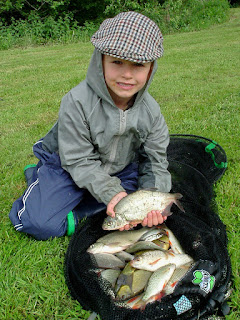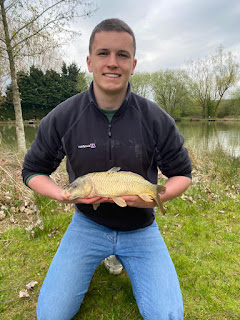I have never received a definitive answer in purely empirical terms to the question "what's the difference between a pond and a lake?" but intuitively when I see a body of water I instinctively categorise it in my mind as either a pond or a lake. Mere acreage has something to do with it, but at that point where size alone means that the definition could go either way (as in: "is this a big pond or a small lake?") there is always something that, although doubtless subjective, leads to me being very clear in my own mind that one small watery environment should be viewed as a "pond" and another of equal size a "lake".
I love ponds. In fact, I would probably go as far as to say that of all the different types of water that demand to be fished, ponds occupy the fondest place in my affections. I have fished rivers, and caught barbel, chub and pike from the mighty rivers Severn and Trent, and perch from the noble Thames, and am happy to concede the fact that, as some literary personage once said, "a river is water in its loveliest form", but for me ponds are water in their "most charming form", and I go fishing, in part, to be charmed.
For some lovers of ponds, the fondness may be a pleasant, sentimental regression into their childhood fishing experiences, but for me that isn't the case. My earliest forays into the delights of angling took place on the lakes and gravel pits of Berkshire and the banks of the River Loddon, and so my nostalgia-tinged recollections are very different from the charming, evocative prose of George Orwell, who in writing about the mid-life crisis of George Bowling, recalls his own boyhood spent fishing (uninvited) on a small farm pond in Binfield.
I love ponds for their intimacy and for their reassuring changelessness. Rivers are fickle, and have to be constantly rediscovered, with floods, bankside tree cutting and the relentless pull of the current, continually altering their personality. To regularly fish a river is to engage in a high maintenance relationship. Ponds by contrast just "are." Sure, unless they receive a modicum of care and husbandry, they silt up, become choked with weed, and shallow up to just a few inches, but if looked after adequately they acquire a timeless quality as they age unobtrusively and without fuss or show. In a world in which the sands seem to be constantly shifting at a sometimes alarming and bewildering pace, ponds speak of a changeless rootedness and offer a sense of reassurance. They also, to my mind, evoke a link with a past that largely no longer is. Born in the 1960's I am perhaps representative of the very end of that era, a time in which time itself seemed to move more slowly, an idyll that barely remains and which those of us of melancholic bent have to work hard to find ways of recreating.
True ponds are also often one of the last bastions of angling in a more traditional form- an antidote to "commercial ventures" where waters that are the same size as "ponds", but which share none of their characteristics or charm, have been overstocked with voracious carp, rendering a species that was once viewed as almost impossible to catch as now amongst the easiest of species to catch. They tend to be inhabited by species which themselves seem to represent the essence and traditions of English angling- olive-flanked tench silky to the touch, and plump, chubby and shy biting crucians. That these are usually of insignificant size is of no matter, and I could happily fish for six ounce crucians or two pound tench all day, without falling prey to the lust for a bigger specimen. That being said, not all the inhabitants of ponds are small- I have recently caught countless perch in excess of two pounds from a pond of about a quarter of an acre, fish which have grown large on neglect, small rudd, and an invasion of crayfish.
It's of no surprise to the angler that Claude Monet spent his latter years beside the pond he'd created at Giverny in 1893, entranced by its beauty and creating some of his most iconic work in response to the spell it cast over him. He created the pond, in his own words, "for the pleasure of the eye", and if when I reach my latter years I'm fortunate enough to still posses the strength to carry a stool, a rod and a net to the water's edge, it will most likely be to a pond that I'll deport myself, for the pleasure of my eye and, if fortune favours me, the odd small fish.

























